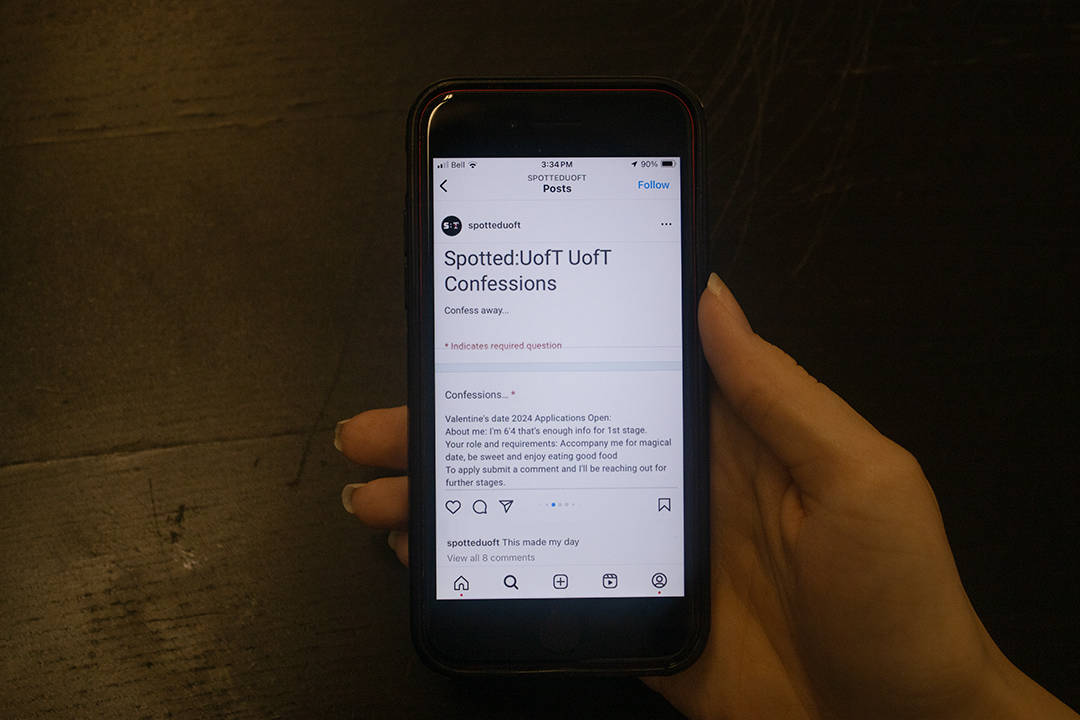Since the days of love letters underneath dorm room doors and orientation dating games, the ways that university students express love have changed on university campuses. The Instagram page Spotted U of T — one of the many anonymous confession pages where U of T students can share their thoughts and experiences — platforms student experiences with love at U of T.
The account, which has almost 5,700 followers as of February 11, has nearly 200 posts. In the past two weeks, every post featured at least one confession related to love or sex, ranging from people looking for a relationship to confessing love to strangers they noticed in their class. As first-year journalism student Emerson Nacawa put it in an interview with The Varsity, the confessions have become “horrendously down bad.” But why is that?
The Varsity spoke with multiple students and the anonymous handler of Spotted U of T about the value that these accounts hold for students, and what they can tell us about the state of love on campus.
The value of anonymity
Cameron Chassels, a first-year paramedicine student, thinks anonymity is key to Spotted U of T’s appeal. “If people knew who was sending in these messages, there would potentially be a lot of beef or ruined images,” he wrote in a message to The Varsity. Students use the Spotted pages as a void into which they can shout dark confessions, ranging from crushes on professors and teaching assistants to dirty thoughts about a classmate.
“There [are] no consequences to anonymity,” added Nacawa.
Back in 2013, the Times of India published an article discussing the rise at the time of online confession accounts, with Symbiosis Institute of Media and Communication Director Ruchi Jaggi noting that anonymity gives students a platform to “vent their feelings without the fear of getting caught.”
Confessing may offer a psychological reward: in a 2017 study published in Frontiers in Psychology, authors Liat Levontin and Elad Yom-Tov suggest that individuals use online anonymous forums to disclose actions or impulses that they feel guilty about, similar to how one might use religious rituals such as confession. Analyzing posts on Yahoo! Answers, the authors find that, when people ask questions that imply guilt, respondents tend to offer answers that relieve the asker’s guilt — providing positive feedback.
“There [are] no consequences to anonymity,”
In a recent piece for Spectrum Magazine, Samuel Girven wrote that many confession pages become settings for individuals to simply state what’s on their mind. As one interviewee suggests in the Spectrum piece, maybe it boils down to fear of missing out — we simply want to know.
Counteracting loneliness on campus
According to the anonymous handler of the Spotted U of T account, most confessions posted to the page are romantic.
Sarah Thielmann, a first-year UTSC student studying psychology and health sciences, wrote to The Varsity that she believes the posts reflect a “surge of loneliness.” With the season’s gloominess and the pressure of Valentine’s Day right around the corner, students may feel more desperate for romantic relationships, according to Thielmann.
Multiple studies have found that relationship status changes and interest in dating peak during the winter months, which may derive from a desire to compensate for lower levels of serotonin caused by lack of sunlight or from wanting to cuddle against the cold.
The Spotted U of T handler wrote that they believe loneliness is a big concern for U of T students because of the “rigorous academics and the lack of a unified campus culture.” This concern about fostering community has come up before on similar pages: In a 2021 article published in University of Calgary (U of C) newspaper The Gauntlet, the administrators of the U of C Instagram page @uoftconfessions discussed how they started the account as a way to foster community.
According to the Student Experience in the Research University survey conducted by the Centre for the Study of Higher Education, U of T undergraduate students are much more likely to disagree with statements such as “I feel that I belong at University” and “I feel valued as an individual at this campus” than students at other research-intensive universities.
Chassels believes that loneliness can explain why so many people use or follow the Spotted U of T pages. “[The account’s sense of community] counteracts the loneliness that people feel on campus,” he wrote. The page provides a space for people to vent and read potentially relatable confessions, creating an “overarching sense of community.”



No comments to display.